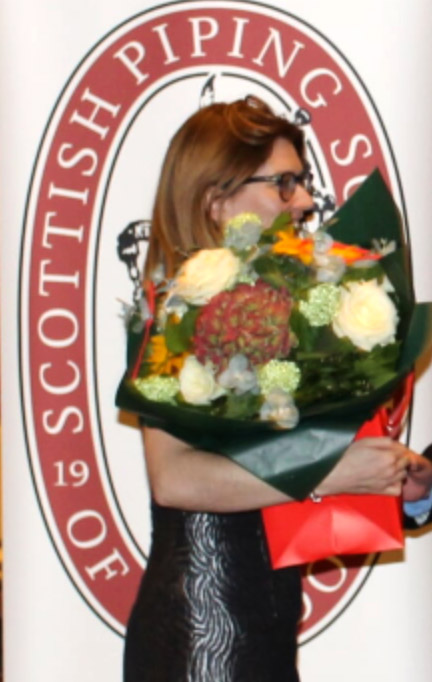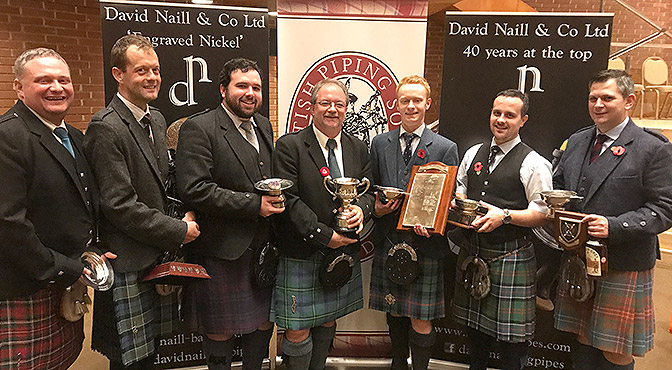I read the comment on yesterday’s results post with a little concern. Organisers and stewards giving of their free time and effort can take these things cruelly. However I do feel the London contest needs a bit of pruning if it is to maintain its mojo.
Prizemoney looked modest and the number of prizes could do with an increase. Any more than 12 entrants and there needs to be a minimum of four places. Is there really room here for a full set of ‘C’ Grade contests and all the amateur events?
I don’t know; the organisers will want to let as many as possible play at what is a high point in the piping calendar. But it may a be a case of less is more and certainly a cap of 25 on all piobaireachd events is an urgent necessity. Having said all that, the SPSL and their stewards (and the judges!) coped brilliantly with the exigencies of the day: 100+ pipers an a’ an a’.

Everything concluded at a reasonable time circa 7pm, with President Andrew Hall efficiently getting through the prizes and raffle with a minimum of fuss. It was a pity some of the prizewinners had to leave early to catch flights. Andrew was right to praise the work of London committee member Alison Gilmour. Talk about efficiency. If anyone kept the day rolling along it was this tireless lady. Alison is also helping out with the Shotts Juniors later this month so no problems there despite their record entry.
But back to London. My weekend began with the Train Journey South in the company of many of my fellow judges. The patter was epic. Here was true fellowship, comradely banter, piping history from those who knew it first hand. Five hours to Euston never raced by so quickly. Those colleagues with a tendency to mire the judging cadre in a slough of controversy should have been with us – they’d have learned a thing or two.
To the hotel where luckily I was sharing with my ex-214 BB mucker Archie Maclean. Apart from being a respected piping adjudicator, Archie is an expert on Renaissance art (he was married in Florence) and has a keen interest in military history, particularly that of WW2, his father John surviving battle after battle from Normandy to Lüneburg Heath. So you see there was never a lack of stimulating conversation to add to the piping discussion.
[wds id=”2″]
Friday evening and a judges’ meeting where we were allocated our duties for the following day, myself and Logan Tannock to the B Piobaireachd. Readers will know of my distaste for any impediment, direct or indirect, which is placed in the way of teaching. Into this latter category comes last year’s draconian ruling by the Solo Piping Adjudicators’ Association to apply the jackboot to any member caught presiding over a contest in which a ‘pupil’ was playing.
I looked around the London meeting room to gauge the number of regularly active teachers – dashed few and even fewer at the very highest level. This SPJA ruling is already paying a negative dividend and the longer it is allowed to continue the more piping will suffer, mark my words. Had anyone sat through the marathon eight and a half hour ‘B’ Piobaireachd they would know what I am talking about. There is a distinct lack of knowledge at this Silver Medal level. You can tell when someone knows how to present their music but is having an off day – and you can tell when they, well, just don’t know what they are doing.
Not in this category was the winner Edward Gaul. His Groat was subtly nuanced, well fingered and thus musically presented. Also ticking these boxes, but less so, was second placed Ben McClamrock from the US with his Red Speckled Bull. My main grouse with Ben was his continual cutting of the B third beat in the ground and early variations. Another good Groat from Gavin Ferguson (rich-toned pipe and clear finger) earned him his third prize, though he was behind Edward in expressive finesse.
Fourth was Steven Leask with the Battle of Bealach nam Brog. Some erratic rhythms in the second line of the urlar doubling, clipped low Gs in the T singling and an out of kilter doubling shoved this fine young player down the reckoning. Sarah Muir was fifth with one of this year’s Silver Medal offerings, Rev Norman MacLeod’s Lament, from Book 16 in the PS collection. Sarah is too good a piper to keep out of any list but here her adherence to the PS’s edited score, rather than to the original as the composer gave us it, meant a loss of melodic impact.
Mentions in dispatches for the following: Peter Skae for bravely submitting Donald MacPhee’s Salute to P/M Richard Parkes MBE, or the ‘Salute to Dickie P’ as Peter called it. This is a melodic new piece in the mould of P/M Donald MacLeod’s ceol mor. It is a fine tribute to the legendary pipe major and maybe we’ll hear his band play part of it in the next FMM concert. Steven Gray had a manful King’s Taxes but the high G was a tad flat and I think he knew it; consequently the concentration seemed wandered at times.
Alistair Murray had the music and pipe for Captain MacDougall but left dare and his crunluath back in Pittsburgh. Matt Pantaleoni had the right idea with Lady Margaret MacDonald’s Salute but the pipe was the poorest we’d heard it for some time. Ross Cowan started well in Hail to My Country but slowed in the taorluath and then the crunluath let him down.
Thirty-two entered and 30 played. The result:
1 Edward Gaul
2 Ben McClamrock
3 Gavin Ferguson
4 Steven Leask
5 Sarah Muir
After the prizes and some pictures it was out into the busy streets and some refreshment. I’m told there was a ceilidh in the hotel bar sustained mainly by the overseas visitors so well done to them for that.
Sunday and the Train Journey North from Hell. Twelve and a half hours door to door standing all the way from King’s Cross to Newcastle. Ah, the joys of judging.
• The Scottish Piping Society of London’s annual competition was held on November 4 at the Kensington Conference Centre. Get full results here and CLASP amateur results here.
[wds id=”3″]
